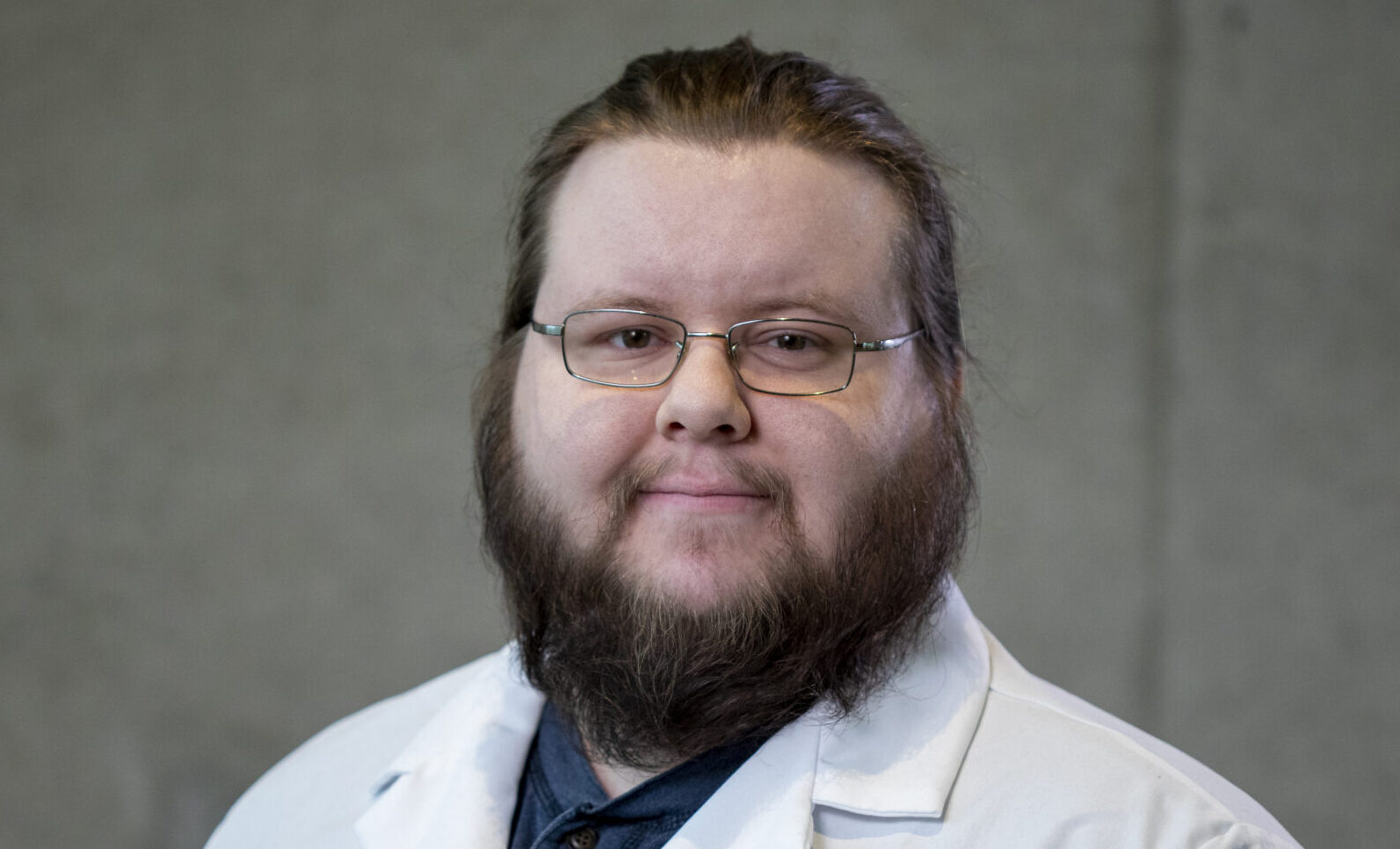Throughout the year, we highlight Van Andel Institute Graduate School’s doctoral students. This month, we’re featuring Joe Floramo, a Ph.D. candidate in the lab of Dr. Tao Yang. Joe’s research seeks to understand how aging and biological stress impact the skeletal system.
How would you describe your area of study to someone without a scientific background?
JF: Every person on the planet is aging, and this is determined by a number of cellular factors that can be affected by environmental or genetic variability. Our lab focuses on different pathways in the skeletal system that are altered because of age and these variables. What I am researching is how one particular pathway, sumoylation, is changed as we age, as we experience different biological stressors, and in disease.
What do you want to do with your degree?
JF: I’m fairly split on what I want to do with my degree. Half of me wants to continue on the path to become the head of a lab and all that comes with that position. But during my degree so far, I’ve discovered that I really like learning about new imaging technologies and how they could be applied, so that may be a route worth pursuing as well. And maybe I’ll find out these two routes aren’t exclusive to one another.
Did you take time off before starting your Ph.D. degree or come directly from an undergraduate or master’s degree program?
JF: Looking back on it, I wish I had taken some time off before starting on my Ph.D. I defended my master’s thesis at Purdue University Northwest after three years of research with Dr. Radmila Stanic and then, two weeks later, I started at VAI. I wish could have taken at least another two weeks off so that I could get a breather before starting on my Ph.D.
How has your previous coursework contributed to your breadth of knowledge?
JF: During my undergraduate and master’s degree, my research focused on extracellular vesicles. While I don’t focus on this field anymore, the knowledge I gained from that project gave me the mindset to think about systemic implications for pathway changes and biological signaling. In addition to research, I taught or assisted in a wide array of labs during my master’s degree, ranging from animal physiology to recombinant DNA techniques. That gave me the perspective of how things at the molecular level are able to impact the overall organism.
Do you think there is any value in social networking with other graduate students in non-related fields?
JF: The majority of my friends from before I joined VAI have no background in the biological sciences. I overwhelmingly appreciate that fact since it helps keep me grounded to the world outside of research. On top of that, talking with anyone from a non-related field is beneficial since it expands your own breadth of knowledge and your world view.
How do you think earning an advanced degree will change your role in society?
JF: I think getting an advanced degree and adding those letters of Ph.D. after your name carries with it a weight of responsibility — mainly the responsibility of thinking about what you say and how you say it, because there will be people that will see that title and put more value in your words.
Did your past experiences in life or education help prepare you for graduate school, or did you have to develop different strategies to succeed?
JF: I think everyone develops new strategies as they continue through life, no matter the situation. I had a fairly decent capacity for stress and ability to plan ahead, but the strategies that help with those situations have definitely adapted as time goes on.
What is your favorite stress-reduction technique?
JF: Definitely cooking as of late. It feels great to take a day where I spend all day in the kitchen making food either for myself in preparation to have meals for the week, or to bring in for others to take home. It is very cathartic to put all my time and energy into making something that I know people will like and then getting to go to sleep fully exhausted.
What accomplishment (academic or other) are you most proud of?
JF: I’d say that my proudest achievement was getting the Indiana Space Grant Consortium’s Master’s Fellowship twice during my master’s degree. It was an open application to graduate students across all of STEM, but was marketed toward aerospace engineers. It felt great to get that award while being a biologist.
Why did you choose Van Andel Institute Graduate School?
JF: I chose Van Andel Institute Graduate School because of the focus on learning how to become a better scientist. The program really helps improve your critical thinking and problem-solving skills while still teaching new breakthroughs in science. Another reason was the attitude of everyone else in the building outside the Graduate School. It didn’t feel like I was reduced down to the title of graduate student, but rather was and am a scientific peer, which comes with both the respect and critical evaluation of that position.
Interested in Van Andel Institute Graduate School? Learn more at vaigs.vai.org and read previous student spotlights here.
